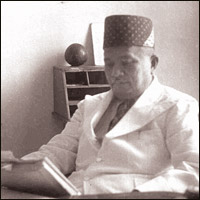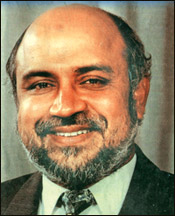UNP no longer a ‘National Party’
 The
UNP is the second national political party formed in Ceylon (in 1946)
with a view to mobilize mass support for a common political agenda
irrespective of parochial concerns, such as communal/ religious, of the
polity. The
UNP is the second national political party formed in Ceylon (in 1946)
with a view to mobilize mass support for a common political agenda
irrespective of parochial concerns, such as communal/ religious, of the
polity.
|

T B Jayah |
National political parties at that time was the need of the hour as
Sri Lanka was emerging a new nation requiring national integration after
a 443 years of colonial rule where social division was pursued as a
tactical necessity of governance.
Therefore the UNP, even though its leadership was spearheaded by the
Sinhala political leadership, had a near perfect tapestry of communal,
religious and other interests represented in the party with powerful
Muslim and Tamil leaders in the calibre of T. B. Jayah, MCM Kaleel and
K. W. Devanayagam among the founder members.
The significance of such national parties is that they bind people on
political and economic objectives, pushing communal and religious
differences to the background, thus laying the foundation for national
integration.
The political party thus becomes sub culture to every member of the
party and since politics is to do with state power, the party often
becomes the over bearing factor subsuming sectarian differences.
Therefore over the years, despite that fact that the more powerful
Tamil leadership elected to follow a racist policy since independence,
people like KW Devanayagam built up their own political base and
represented the UNP as the Member of Parliament for Kalkudah until the
‘proportional representation’ diluted the electorate.
Thus the UNP had such strong base among eastern Tamils, that even
despite the separatist frenzy of TULF in the late 70s, the likes of
Devanayagam continued to retain their seats at the 1977 election.
The position of the Muslim vote had been different. The Muslim
leaders, who did not enjoy the ‘blue eyed’ status as the Tamils under
British colonialism, assimilated more readily into national politics
after independence.
Hence the UNP, being the first national party enjoyed the benefit of
having a large Muslim vote in its traditional vote base. Also since
Muslims have been traders for generations, the more commercial oriented
UNP policies suited the Muslims better.
When Premadasa conceded the eastern province to the LTTE during the
1989 peace talks the Muslims faced issues on social and economic
concerns.
In that unstable scenario a man named M H M Ashraff organized pocket
meetings addressing the Muslim concerns in the East and by and by he was
able to impress the Muslims of the need to have a political party to
represent their interests. Thus the Muslim Congress started to make its
presence felt in the political arena from the early 1990s.
|

M H M Ashraff |
But even then this Muslim Congress was confined to the East and the
Muslims in the rest of the country continue to vote with the two
national parties, the UNP and the SLFP.
At the 1999 Presidential election, Ranil Wickremesinghe, in his own
politically calculating way, started to pay more attention to the
minority votes in the Tamil and Muslim areas as he expected that to be
crucial when the Sinhala vote got equally split between the two main
parties.
As a result he endeared Rauf Hakim into the UNP granting all the
demands he made on him after the 2002 Parliamentary polls.
Hence Hakim and his SLMC managed to retain their own communal
policies even they formed part of the UNP Government in 2002. What is
worse was that the SLMC was then allowed to become the spokesperson for
Muslims replacing the traditional Muslim leadership within the UNP like
M H Mohammed and Mohammed Maharoof.
Hence the SLMC has now made inroads into the Muslim vote in other
parts of the country as well making the average Muslim more ‘Muslim’
than national in their thinking. Wickremesinghe as the UNP leader paid
little attention to this change as he had set his eyes on a large
minority vote to help him become the President.
Hence today the SLMC, having taken over the Muslim part of the UNP
stands as an appendage of a coalition with freedom to take decisions on
communal lines whenever it suited their interests.
The traditional Tamil vote within the UNP too, suffered the same fate
under Ranil Wickremesinghe’s leadership.
To bolster its Tamil vote at the Presidential hustings, the UNP
started endearing to the extremism of the LTTE conceding even parts of
the country to be controlled by terrorism. By recognizing the LTTE, ‘as
the sole representative of the Tamils’, at the 2002 CFA the UNP
effectively betrayed all the Tamils loyal to the national political
parties for the sake of its political ends.
As a spinoff of all these communal pandering, now the UNP is faced
with a new threat in the form of ‘Mano Ganeshan’. He is now insisting
that the UNP should not forward its own candidates to Colombo and
instead allow his party to contest Colombo.
The UNP is making them even stronger at the expense of the UNP vote.
Thus with Ranil Wickremesinghe as the UNP leader the day UNP becomes
another ‘minority party’ will not be far off. |



